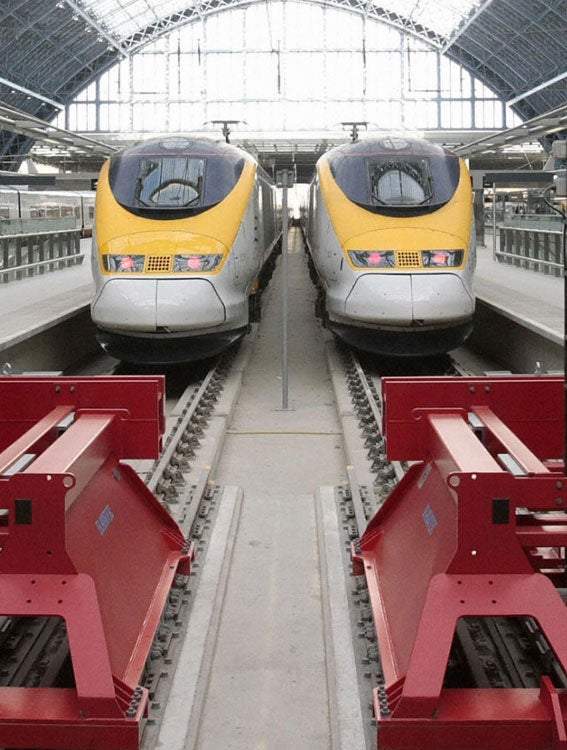The currency crunch: British tourists pay price for euro's strength
Today a euro is worth 80p, an all-time high against the pound. Bad news for British holidaymakers – but are there more serious consequences of living next door to the world's strongest currency?

Tens of millions of British people will experience their own credit crunch on holiday this year as the soaring value of the euro forces them to pay more for everything from the price of a coffee in a Parisian cafe to a hotel room in Barcelona. As currency traders pushed the European single currency to a record high against the pound yesterday, holidaymakers were coming to terms with the fact they now have almost a fifth less spending power on the Continent than a year ago.
The 17 per cent fall since last February has come about as the euro has powered ahead on the strength of its member economies, while the pound has slumped, most recently because of the knock-on effects of the sub-prime collapse in the US.
The euro's new high of 80p, reached in early trading yesterday, came after the International Monetary Fund warned that UK growth would only hit 1.6 per cent this year, compared with the Government's claim of up to 2.25 per cent.
The euro's surge may spur new theories from economists that the currency of the eurozone will become the main international unit of currency as early as 2015, upsetting almost the best part of a century of dominance of the dollar.
For holidaymakers, however, the collapse of the pound has an earthier reality that will curtail their spending power in shops and restaurants in Ireland and on the Continent. In practice, it means spending money of £500 earmarked for eating out, trips and presents is now worth only £415 in the 15 eurozone states.
The 42 million foreign holidays a year that British people take are influenced by affordability and, during the past two years, the cheap dollar has lured thousands of Britons to stock up on designer jeans and iPods in New York.
However, the majority of foreign holidays, some 31 million, are taken in the eurozone and going there – and staying there – has become markedly more expensive.
As a result of the currency fluctuation, a family weekend break to Disneyland in Paris that would have cost £456 last year costs £533 this month. A day's car rental in Vienna that would have set back a Briton £56 now costs £67.
And those expecting to savour a meal for two Ferran Adria's acclaimed El Bulli restaurant in Spain will find the experience has risen in price from £195 to £236.
Many people who had been hoping to go on holiday to France or Spain may be forced to change plans and stay at home instead.
Others may look for cheaper destinations outside the eurozone, such as Bulgaria or Croatia.
The Association of British Travel Agents said yesterday that the rise of the euro might prompt the growth in journeys to Turkey and Egypt as well as long-haul trips.
At home, the surging euro will apply upwards pressure on much that we import from the Continent, from cheese to cars, though retailers may take some of the pain.
But there will be a sign of relief from British companies battling to export their goods as their products become cheaper in the 15 euro countries.
After a shaky start in 1999, when the economies of the 11 participating states were lurching downward, the euro has become a totemic success for the European project and has been rising against the pound for more than a year.
Further pressure is likely to be piled on to the pound – and in favour of the euro – today if, as expected, the Bank of England's Monetary Policy Committee cuts interest rates. Some economists believe the rate may cut by as much as half a per cent.
Geoff Kendrick, a currency strategist, said: "The UK has clearly softened a lot more than Europe and I guess that's why we'll see the Bank of England cut rates tomorrow while the ECB will be hawkish... At least for now it looks like the trend (in euro/sterling) is well and truly intact."
The pound has weakened after days of bad economic news which has increased the chances of the interest rate being cut, reducing the attractiveness of holding the currency.
This week, the Halifax house price index posted its steepest monthly fall in over 15 years, a 2.5 per cent fall in a single month. Banks have withdrawn their 100 per cent mortgage deals and Nationwide's consumer confidence fell to its lowest level in four years.
Subscribe to Independent Premium to bookmark this article
Want to bookmark your favourite articles and stories to read or reference later? Start your Independent Premium subscription today.

Join our commenting forum
Join thought-provoking conversations, follow other Independent readers and see their replies